After spending 27 months in jail on charges that range from serious to bizarre, Samajwadi Party (SP) stalwart and Rampur Sadar MLA Mohammad Azam Khan has emerged as a symbol of marginalisation of Muslims during the ‘double-engine’ government of the Bharatiya Janata Party (BJP).
Mr. Khan, one of the most powerful Ministers in the SP-led Uttar Pradesh government, was arrested on February 26, 2020 after a flurry of FIRs were filed against him two years after the BJP government led by Chief Minister Yogi Adityanath came to power in the State in 2017. The first of those FIRs was filed on January 3, 2019 based on a BJP leader’s complaint that Mr. Khan had allegedly forged his son’s birth certificate, while 81 cases were registered immediately before and after the Lok Sabha polls that year. Mr. Khan finally walked out of Sitapur district jail on May 20 this year, a day after the Supreme Court exercised its special powers under Article 142 of the Constitution to grant him interim bail in a land grabbing case, the last of the 88 cases he was implicated in.
According to the FIR, Mr. Khan had illegally acquired a 13.84-hectare plot while constructing his dream project — Mohammad Ali Jauhar University. He was accused of usurping enemy property as the plot’s owner, Imamuddin Qureshi, had moved to Pakistan during Partition. One of the bail conditions set by the Allahabad High Court, in its May 10 order, was a survey of the plot. On May 27, the apex court stayed the survey and directed the State government to file a reply for not removing the barbed wires that were used to seal a portion of the property to conduct the survey.
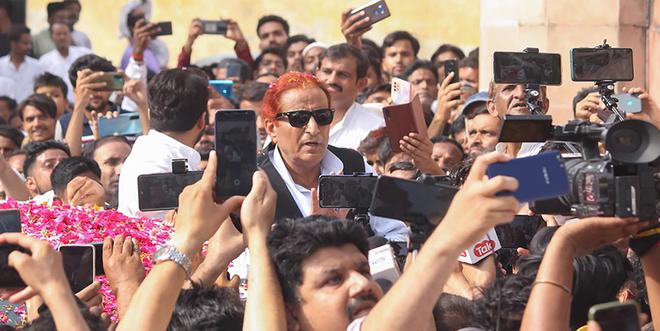
At the roadside Gupta Food Corner in Rampur, a stone’s throw from the sprawling campus of the Jauhar University, people, over a plate of rajma chawal, remember Mr. Khan as a leader who, in the mid-1970s, promised to take politics out of Noor Mahal, the abode of the Nawab of Rampur, to the huts of the poor and lived up to it. When he became an MLA in 1980, the government offices were run from the properties of the Nawab. “Azam bhai built the infrastructure of the city and it doesn’t belong to one community,” points out Syed Qayam Mehendi, a contractor.
Vakil Ahmad, a tailor from Meerut, says Mr. Khan is being targeted because he tried to place a pen in the hands of the Muslim youth. Referring to the Jauhar University, he says after Aligarh Muslim University (AMU), no university was built that could cater to the higher educational needs of the youth in the region. “Now, the BJP government has taken a lead by establishing new universities, but why destroy Azam’s?”
Dr. Sheeba Khalid, a professor of sociology and author of I Am Akhilesh, says the university doesn’t teach theology. “It was teaching modern science and humanities to all communities. Whatever the irregularities, political and legal battles have spoilt the academic atmosphere and put students and teachers under a cloud for no fault of theirs.”
At Mr. Khan’s residence in Rampur, his followers are engaged in an animated discussion on how the Rashtriya Swayamsevak Sangh and its affiliates have penetrated into villages by selling the idea that after a generation, the lands of Muslims could become theirs.
A Dalit activist is keen to meet Mr. Khan to request him to put his weight behind the government’s Social Justice Commission Report for the Other Backward Classes because it will lead to reservation in jobs for the most backward castes among Muslims.
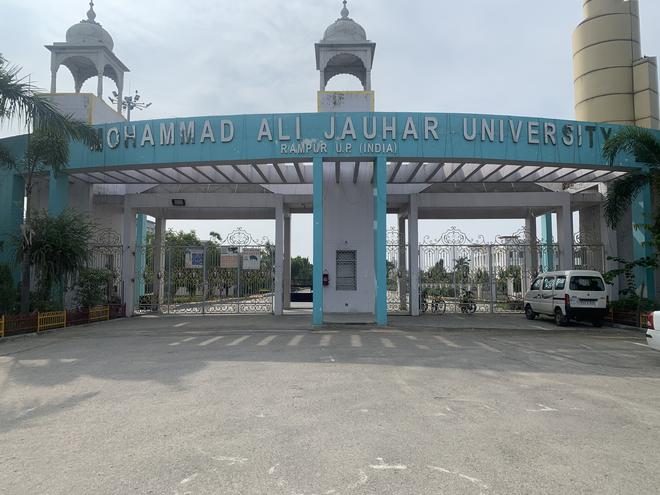
Not lost in the woods
The astute politician that he is, Mr. Khan is playing the victim to the gallery, with a touch of tragicomedy. A closer look, however, reveals that he is not lost in the woods as it appears. Of course, the persistent cough, a residue of the COVID-19 infection that he contracted during his stay in jail, still troubles him. (In fact, a day after the interview, he was admitted to a hospital in Lucknow.)
The black shades that he often sports these days are because of a cataract operation, but he describes them as the symbol of the blind, mute and speechless Muslims that the ruling party wants in India. “I was reduced to an item girl, so I am playing the part,” he says with a wry smile. “Imagine a 10-time MLA, two-time MP and former Leader of the Opposition has been charged with looting ₹16,500 from a liquor shop with his wife and son,” he adds, explaining the facile nature of the charges.
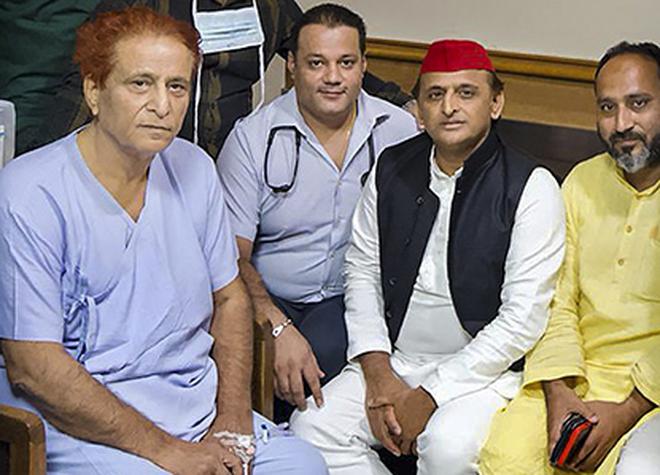
The two Supreme Court orders — first granting him interim bail by exercising special powers under Article 142 and then allowing regular bail and setting aside the conditions imposed by the Allahabad High Court — have added heft to his narrative. For his supporters, the loss in the Rampur Lok Sabha bypoll in June is that twist in the plot that makes the public root for the protagonist who has just bitten the dust to launch a counter-attack before the climax of 2024.
“The Supreme Court order has removed the mud that the BJP had put on my face,” says Mr. Khan, adding whatever has happened with him in the last few years has never occurred in a democratic set-up before. After spending time behind bars, he says, his social contacts are better than before. “After years of oppression, even those who had misgivings about me would have realised that I and the road I took were right,” he says.
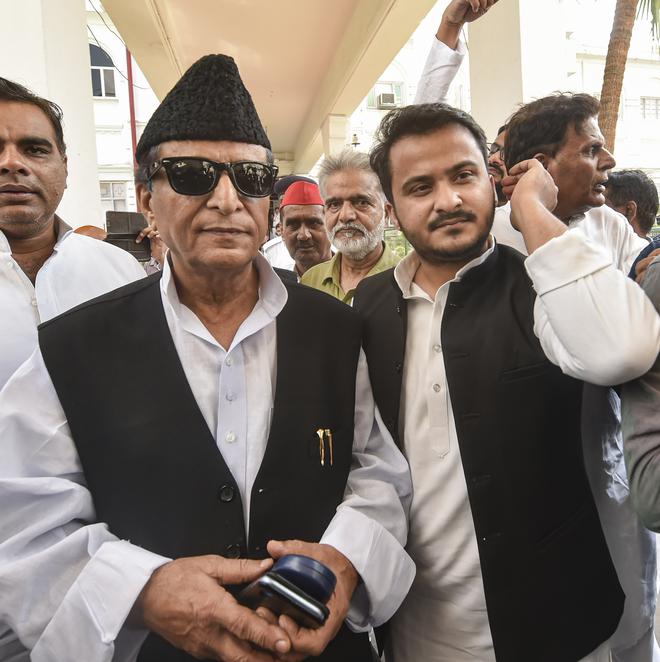
Political route for Muslims
But the political route that he is showing to Muslims seems contentious. After the loss in the bypoll, Mr. Khan said Muslims should stop voting. “When you have decided you will not allow Muslims to vote, what is the point of participating?” he says. “Nobody is acknowledging that the administration prevented Muslims from voting during the bypoll and none of those so-called democrats has come forward to ask what made Azam issue such a strong statement.”
Asim Raja, a confidant of Mr. Khan who unsuccessfully fought the bypoll, quotes Caliph Hazrat Ali, who said “the system of disbelief can work, but the system of injustice cannot”. Mr. Raja says the cases against Mr. Khan and the selective use of bulldozers are a part of the plan to make Muslims second-grade citizens. “If you think Muslims could be bought with free ration, you are mistaken. We demand fair representation in democratic institutions and if Muslims are not allowed to vote, it would be disastrous for our democracy. The Election Commission should find out why the percentage of voting dropped dismally in Muslim-majority centres in the bypoll after a heavy turnout in the Assembly election. I have written to them.”
Like his rivals, Mr. Khan knows how to turn adversity into opportunity. Questions on serious charges often elicit emotional responses. On the land grabbing case, where as a Minister in the SP government he allegedly got the evacuee property converted into Waqf land, he says, “I expected the Prime Minister to pass a Bill in Parliament allowing the university to use the alleged enemy property and say, ‘Azam, beti bachao, beti padhao’. Our hearts would have swelled with gratitude. Instead, what we got to hear was ‘ Jo Azam ka sir layege, woh Ram bhakt kehlayega’.”
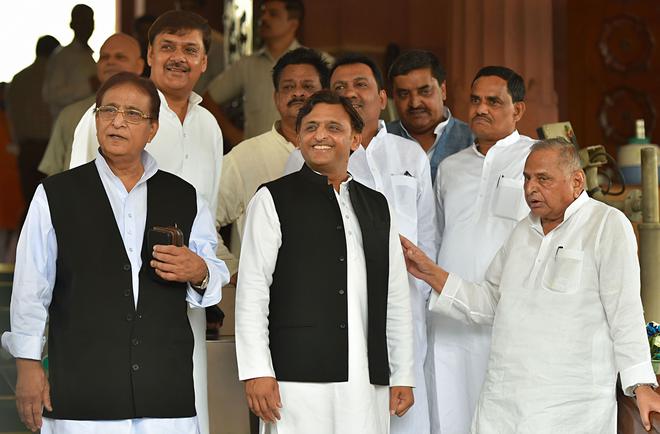
His detractors say had Mr. Khan still been popular, people would have protested like the Congress workers who took to the streets after the Enforcement Directorate (ED) summoned party leaders Sonia Gandhi and Rahul Gandhi in the National Herald case. Mr. Khan says he didn’t allow supporters to come out. “We had seen the result of protests, called by some local ulemas, during the anti-Citizenship Amendment Act agitation in Rampur, where one person lost his life because of the administration. There would have been bloodshed had I insisted. I knew the intent of the government. At this age, I don’t want to carry young corpses on my shoulders. Is it not political pragmatism?” he asks.
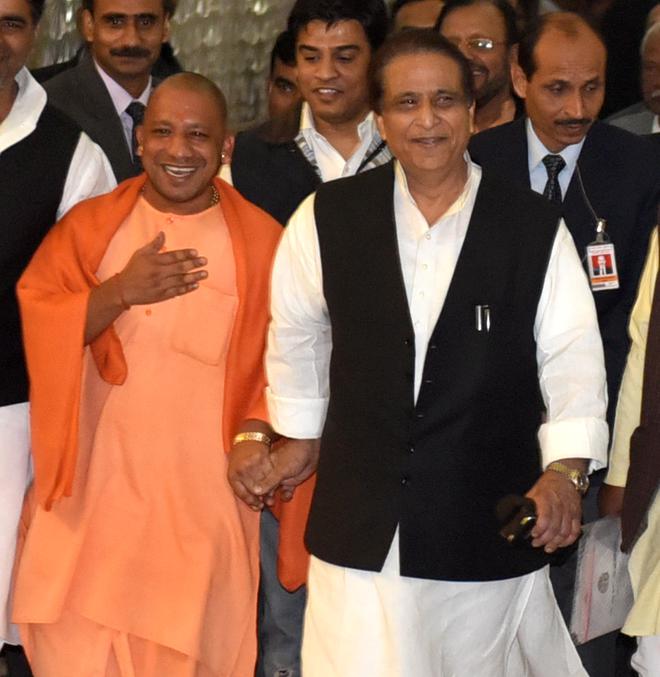
Mr. Raja alleges that the administration discriminates on the basis of religion even while taking action against SP members. The charge took a twist when party general secretary and Rajya Sabha member Ram Gopal Yadav met the CM on August 1. While Mr. Khan’s supporters have maintained silence in public, sources say they are miffed with ‘Professor sahib’, as Mr. Ram Gopal is popularly known, for putting in a word for senior party leader Rameshwar Yadav and his brother who are facing action from the district administration of Etah.
“Both Rameshwar ji and Azam bhai are facing the bulldozer of the U.P. government, but we can sense that the party leadership has opted to put its weight behind their kin,” says a supporter of Mr. Khan, after Mr. Ram Gopal’s letter to the Chief Minister went viral.
When party spokesperson Udaiveer Singh tried to defend the meeting and listed the steps the SP had taken to support Mr. Khan, his son Abdullah Azam Khan warned Mr. Singh to stay within his limits and retorted that if his father’s name was dragged into the controversy, the matter would escalate.
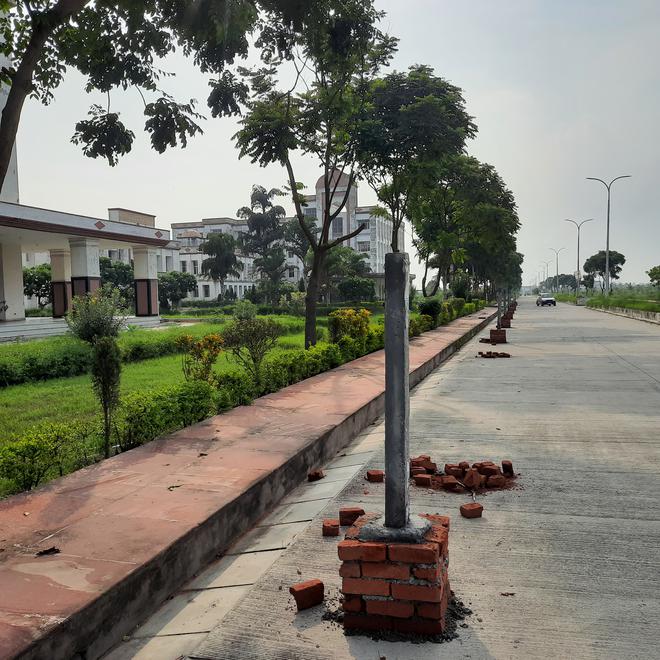
Tenuous ties with the party
Talk of his tenuous relationship with the SP and Mr. Khan resorts to poetry, “ Jeena teri gali main, marna teri gali main (I will live and die for it).” He describes party chief Akhilesh Yadav as a simple, kind-hearted man who understands the pain of the poor. And, more importantly, he underlines that Mr. Yadav has had “no connection with the people [BJP] who put me behind bars”.
He agrees that the SP president gets insecure of the stature of party elders. “I don’t know why. I may be naive, but I’m not a fool to aspire for the PM or CM’s post. It was only when I was called a Pakistani agent that I retorted that had I migrated, I would have secured the coveted post. Perhaps, the coterie that can’t win a few thousand votes on its own is responsible, but he [Mr. Yadav] respects my advice.” It reflected when his acolytes, Jasmeer Ansari and Shahnawaz Khan, were picked as MLC candidates recently. Mr. Ansari is being seen as an antidote to the BJP’s push for Pasmanda (marginalised) Muslims.
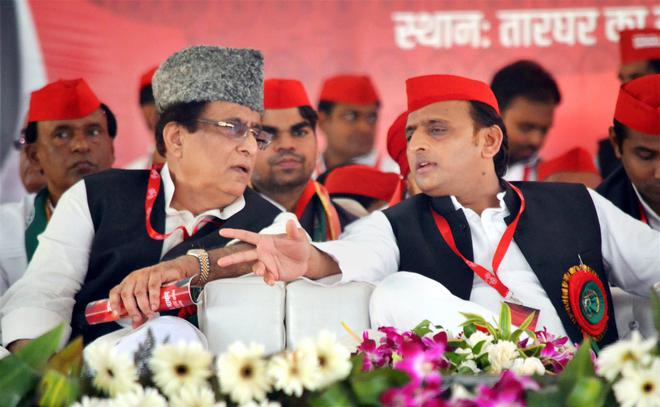
However, young Muslim leaders close to Mr. Yadav suggest that Mr. Khan is being tolerated because the SP president doesn’t want another charge of sidelining the founder member of the party. “There is respect for Azam bhai and some of his wishes are being met. But in the new set-up, he could not control the party like before and criticise the party president in public,” says an emerging SP leader, requesting anonymity.
The problem is, he says, Mr. Khan doesn’t allow anybody else to grow and has a history of blackmailing the party to accept his demands. “Instead of followers, he loves to create sycophants.” But the leader admits nobody has the stature to take him on as of now.
There are hints that the party leadership is waiting for Mr. Khan to walk into retirement gracefully and replacements like Imran Masood, from neighbouring Saharanpur, and Abu Azmi, from eastern Uttar Pradesh, are waiting in the wings. Mr. Azmi was tried in the run-up to the Assembly polls, but was rejected in western Uttar Pradesh.
Creating a new Azam Khan
Not in a mood to give up, Mr. Khan says “his walid sahib [SP founder Mulayam Singh Yadav]” also tried it despite being his trusted partner in all his fights. “Over the years, many attempts have been made to create a new Azam Khan but they forget that an Azam Khan is born once in 100 years. To become one, you need a lifetime. I have suffered for standing up to power. When I started, I was kept in Varanasi jail by the Indira Gandhi government during the Emergency. At this stage of life, the BJP has sent me behind bars. If somebody has a biodata like me, he can of course try.”
Old-timers say the Rohilla Pathan, whose father was in the service of the Nawabs, has always been a bit of a snob and had a dramatic flourish that could evoke passions. “Both Azam and Arif Mohammad Khan [Kerala Governor] had emerged at the same time out of student politics in Aligarh Muslim University over the minority character of the institution. Azam could be ill-tongued as well as extremely polite. During public meetings, he would sway emotions at will. He was against Indira Gandhi and was forcibly taken by the police from a jam-packed V-C lodge, days after the Emergency was imposed,” recalls Dr. Rahat Abrar, a former public relations officer of AMU.
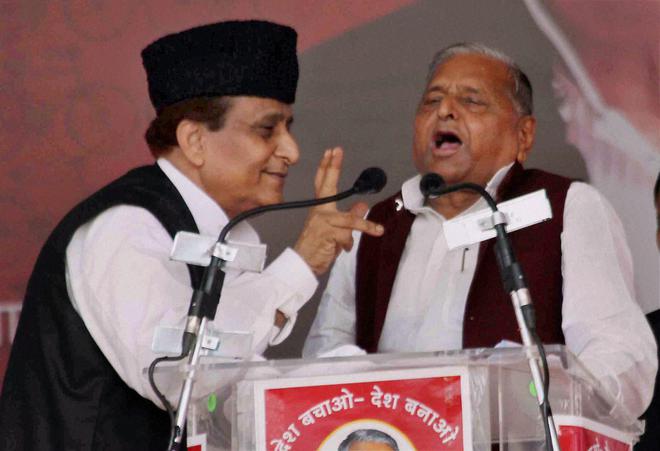
Veteran journalist Qurban Ali says when Mr. Khan was in the Lok Dal, party president Chaudhary Charan Singh considered giving the party ticket to a disgruntled member of the royal family of Rampur. “Mr. Khan staged a protest at Chaudhary sahib’s residence and said it was a matter of his naak [pride]. The former Prime Minister commented that Azam’s nose has become a little too big for his own comfort before conceding to his demand,” Mr. Ali says.
After Charan Singh’s son Ajit Singh’s entry into politics, fissures emerged in the Lok Dal. “While most Muslim leaders and some Yadav leaders sided with Ajit, Azam chose to stand by Mulayam. Together, they laid the foundation of the SP and that started a long and fruitful friendship. When journalists would ask Mulayam about Rampur, he would say Azam is the CM of Rampur. The Amar Singh-Jaya Prada period created some hiccups, but Mulayam eventually accepted that Azam was indispensable.”
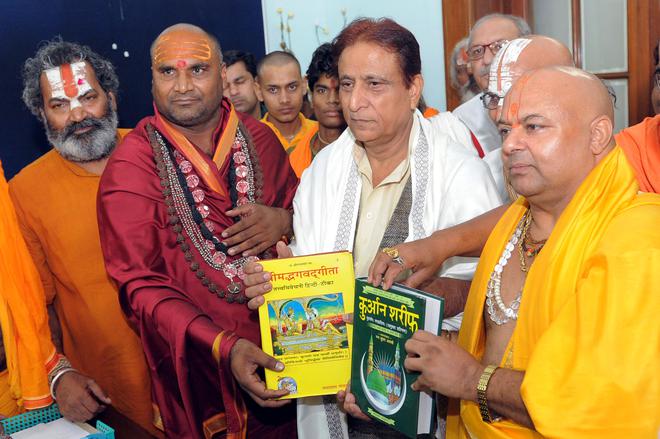
‘Wedded to secular politics’
Mr. Ali holds that, unlike Mr. Arif Mohammad Khan, Mr. Khan has been consistent with his ideology. Right from his Lok Dal days, he is wedded to secular politics and has resisted communal rhetoric despite being provoked. This, he says, separates him from somebody like All India Majlis-e-Ittehadul Muslimeen chief Asaduddin Owaisi. But unlike Mr. Owaisi, Mr. Khan didn’t show an inclination to spread his wings. “He was always more comfortable in Lucknow and Rampur than in Delhi,” Mr. Ali says.
However, in the 90s, the former BBC journalist says, Mr. Khan, after tasting power, developed the traits of the Nawabs that he fought against. Akash Saxena, lawyer and the BJP candidate who lost against Mr. Khan in the Assembly poll, agrees that the politician brought development to Rampur, but says, gradually, it became a money-minting exercise for himself and his cronies. “There was no e-tendering then. It was his will that was the order of the day.”
Mr. Saxena, whose father Prem Bahadur Saxena unsuccessfully fought against Mr. Khan in 1980 on a BJP ticket, is behind at least three dozen cases against Mr. Khan. “The Supreme Court has only given him bail; he has not been exonerated.” The strongest case against Mr. Khan, Mr. Saxena says, is that of forging the birth certificate of his son because it has paper evidence.
Mr. Khan’s supporters feel that the cases reek of political vendetta as many of the complaints were lodged more than a decade after the alleged incident, but Mr. Saxena maintains that after he brought the irregularities to light, more people have gathered the strength to stand up against the leader who used to keep officials in his pocket.
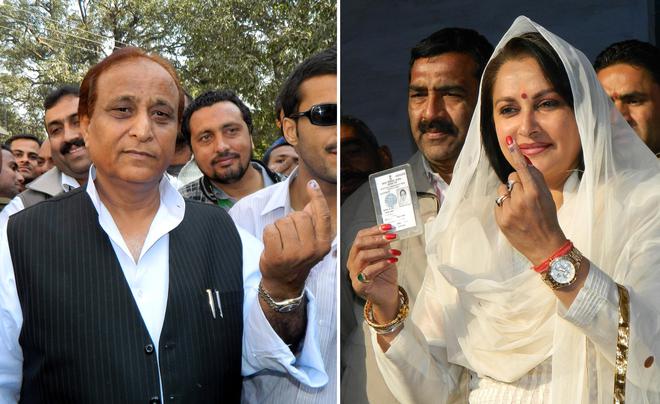
Aunjaneya Kumar Singh, Divisional Commissioner of Moradabad, who was the district magistrate of Rampur when most of the cases were filed and whom Mr. Khan often charged with working at the government’s behest, says every charge was fairly probed and Mr. Khan misused his position as a Minister. Some charges, he says, appear far-fetched in the political language of a seasoned politician, but will stand in the court of law. “The cases reveal that the claim of improving the education standards of poor Muslims is just a facade.”
Mr. Singh says members of both the ruling and Opposition parties feel that the action against Mr. Khan was driven by a political agenda and it diminishes the role of an impartial officer. “I agree irregularities have and are being committed by various politicians, but I was posted in Rampur and I had to face Mr. Khan.” Mr. Singh says the former Minister did cross the line of dignity when dealing with officials. “We represent a chair but he tends to make it personal.”
For Mr. Khan, the relationship between an official and a politician is akin to that between a cat and a mouse. Curiously, while officials and party insiders complain of him using disparaging language, Mr. Khan himself talks of maintaining decorum in public life. One of the reasons the public rejected the SP alliance during the Assembly poll was the language used during the campaign, he says. “When the BJP attacked us, the public was with us, but when phrases like chal sanyasin mandir main (by the then ally Om Prakash Rajbhar of the Suheldev Bharatiya Samaj Party for Yogi Adityanath) were used, people realised that there was no difference,” he says.
In fact, he holds the wrong choice of words and references responsible for the SP chief’s silence on Muslim issues during the campaign. “Once the word Jinnah came out of him, the BJP ran away with it. And he could not put it in context. From then on, he could hardly say anything to the community.”
But didn’t Muslims still vote for the party? “Obviously, the SP was the only alternative to defeat the fascist forces. When the Bahujan Samaj Party was strong, voters picked the party that was better placed to defeat the BJP. Now, the ED’s knock decides who is with or against the BJP. We all know the ED hasn’t visited Mayawati for a long time.”
On whether the BJP missed a trick by going all out to defeat Mr. Khan’s candidate in the bypoll as by showing his fear, the party could have secured more votes in the surrounding districts, Mr. Saxena says the defeat was the people’s will. “He is against the interests of Muslims. After the Nawabs, they became the slaves of Azam. Once Rampur was only second to Kanpur in terms of industries, now it is a city of rickshaw pullers. We don’t see an accused as a competition.”
Mr. Khan agrees not every Muslim loves him, but says the one who is loved by all is a hypocrite. He denies that he sees himself as the new Sir Syed Ahmad Khan, but adds even he could not establish a university in his lifetime. “And the British government awarded him titles. See where I stand today,” he says.
Interestingly, the BJP had to import Ghanshyam Singh Lodhi, a protégé of Mr. Khan to defeat Mr. Raja in the bypoll. And after spending decades as the Congress’s face, the Nawab family is now inching closer towards the BJP. Mr. Khan feels the royalty always drew closer to power. “India would have won freedom in 1857 had the Nawab’s army not culled the First War of Independence to prove their worth to the British Crown.” Mr. Saxena attributes it to the increasing size of the ruling party.
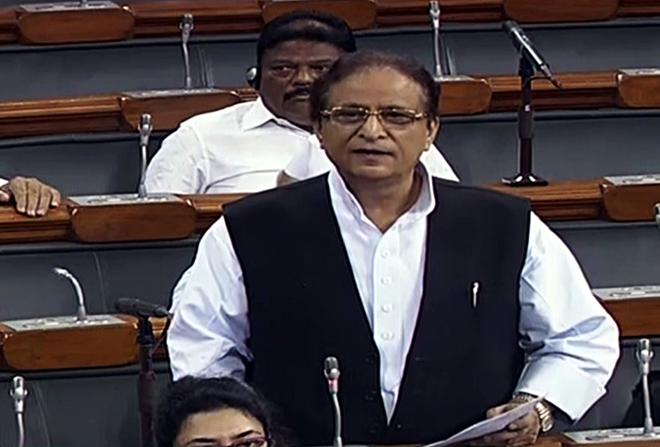
‘The underdog’
Mr. Ali maintains had Mr. Khan not been pushed to the wall, it would have been difficult for Muslims to accept him as a victim. “Not many from the community bought the idea of the Jauhar University as a mission to educate poor Muslims. It was seen as a part of Azam’s empire, but now the situation is different,” he says.
Today, Mr. Khan is back to where he started from. The difference is once upon a time, he was the underdog, now, at 73, he is acting as one.







